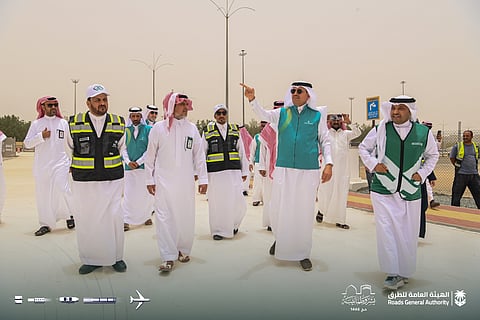Hajj 2025: Saudi Arabia expands cooled, rubberised roads
Road-cooling techniques aim to reduce stress during long-distance walking

Cairo: Saudi Arabia has expanded the use of cooled and rubberised roads to help reduce the impact of extreme heat on pilgrims during the annual Islamic Hajj pilgrimage.
The initiative, which began in 2023, is aimed at moderating ground temperatures and improving the walking experience during long treks between holy sites.
This year, the heat-reducing road surfaces have been expanded by 82%, with more than 84,000 square metres paved across the Arafat plains—where the pilgrimage reaches its peak—according to the Saudi Roads General Authority (RGA).
The cooling system uses locally sourced materials that minimise sunray absorption, lower surface temperatures by around 12°C, and increase sunlight reflection by 30–40% in the mornings. This helps create a more comfortable environment for pilgrims while also cutting energy use and reducing air pollution.
Additionally, the RGA said the "Flexible Rubber Roads" initiative—introduced last year—has been expanded by 33%. Designed to reduce foot injuries, especially among elderly pilgrims, the technique softens asphalt walkways using rubberised material to reduce strain and enhance mobility.
With more than half of this year's pilgrims expected to be elderly, the rubberised roads aim to alleviate joint pain and ease movement between holy sites.
The upcoming Hajj, set for early June, will be the last to occur during peak summer heat for the next 16 years. Starting in 2026, due to the Islamic lunar calendar, the pilgrimage will gradually shift into cooler seasons—first spring, then winter.
Sign up for the Daily Briefing
Get the latest news and updates straight to your inbox




![The accident occurred while the family was returning to Jeddah after performing Umrah in Mecca. [Illustrative image]](http://media.assettype.com/gulfnews%2F2025-06-19%2Fwb4pjufj%2F202506193431593.jpg?w=320&auto=format%2Ccompress&fit=max)
![An aerial view shows Kingdom Tower in the Saudi capital Riyadh. [Illustrative image]](http://media.assettype.com/gulfnews%2Fimport%2F2020%2F05%2F26%2FSaudi-Riyadh_172500ec388_large.jpg?w=320&auto=format%2Ccompress&fit=max)

